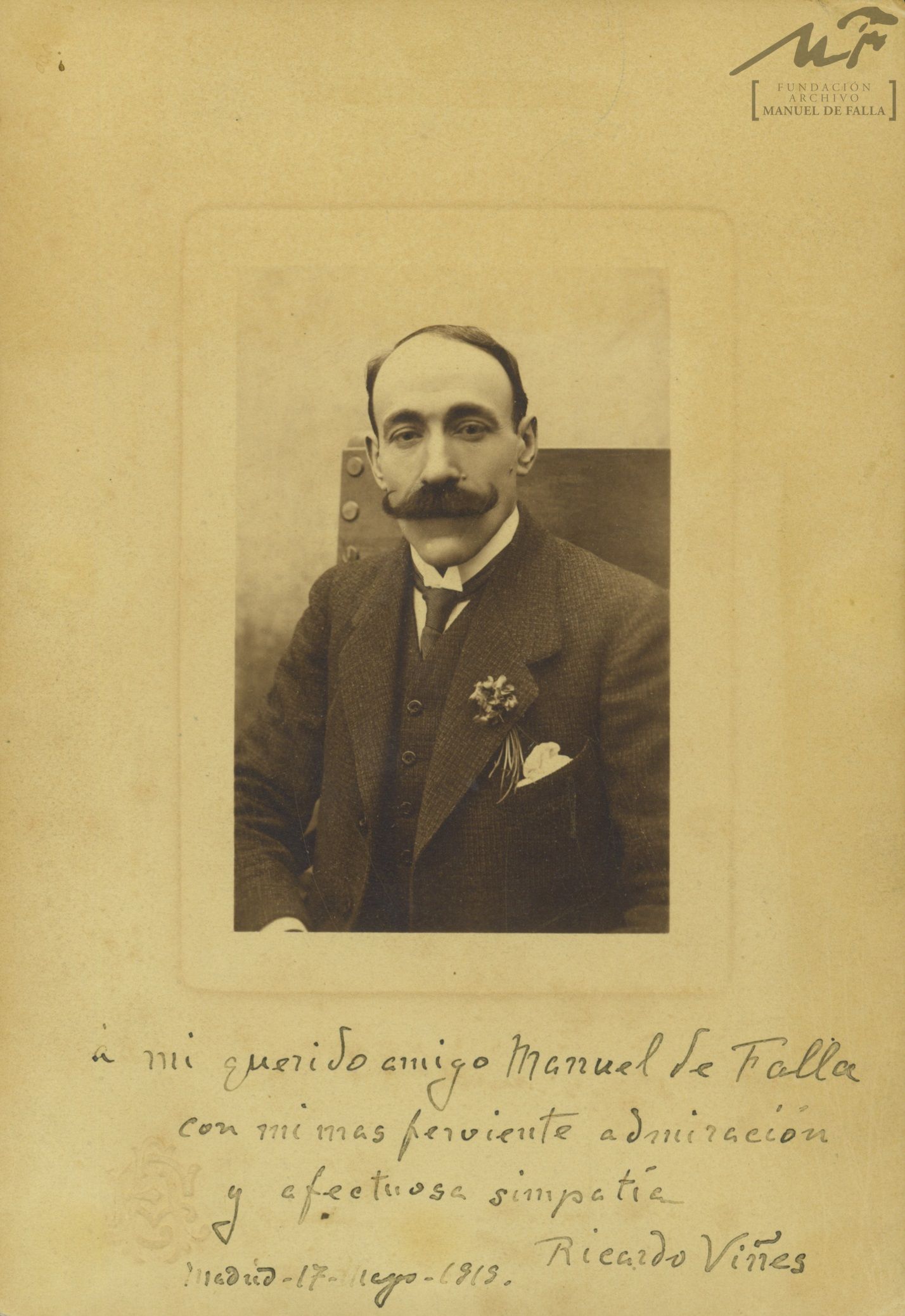 Persona - Viñes, Ricardo (1875-1943)
Persona - Viñes, Ricardo (1875-1943)
Identificación
Tipo:
Persona
Forma autorizada:
Viñes, Ricardo (1875-1943)Formas paralelas (otros idiomas) Otras formas
Fechas de existencia:
Lleida (España) 1875-02-05 - Barcelona (España) 1943-04-29
Historia:
Pianista, compositor y profesor español.
Nació el 5 de febrero de 1875 en Lérida, era hijo del abogado Javier Viñes Solano y de Dolores Roda Vives, pianista aficionada. Tuvo dos hermanos, José, ingeniero, y Eugenio, comerciante.
Autodidacta en materias como las matemáticas, la astrología, el árabe o el hebreo, recibió sus primeras lecciones de música de Joaquín Terraza, organista de la catedral de Lérida. Juan Bautista Pujol fue su profesor particular entre 1885 y 1887, año en el que ingresó en la Escuela Municipal de Música de Barcelona. Allí ganó un primer premio en la especialidad de piano y, poco después, se trasladó a Francia. Fue aceptado por Charles-Wilfrid de Bériot entre sus alumnos del Conservatorio parisino, en el que ganó un primer premio de piano en 1894. En la capital francesa trabó amistad con figuras francesas y españolas como los pintores Odilon Redon, Isidro Nonell y Pablo Picasso, y los compositores Maurice Ravel, Isaac Albéniz, Enrique Granados, Erik Satie o Manuel de Falla, al que conoció el 29 de septiembre de 1907 e introdujo en el grupo artístico Les Apaches. Finalizados sus estudios, ofreció su primer recital de piano en la Salle Pleyel de París el 21 de febrero de 1895, inicio de una carrera como concertista que le llevó hasta el Norte de África, América Latina y Europa. Su reconocido prestigio como intérprete propició que grandes autores del momento le confiasen el estreno de sus obras, como por ejemplo: “Pour le piano” (1902), “Estampes” (1904), “Masques” (1905) o “Images” (1905-1908) de Claude Debussy; “Jeux d’eau” (1902), “Pavane pour une infante défunte” (1902), “Miroirs” (1906) y “Gaspard de la nuit” (1909) de Ravel; o las “Pièces espagnoles. Cuatro piezas españolas” (1906-1909) de Falla, obra dedicada a Isaac Albéniz que estrenó en la Salle Érard de París, el 27 de marzo de 1909, en un concierto que organizó la Société Nationale de Musique. Como muestra del afecto de sus amigos músicos, le fueron dedicadas piezas como “Poissons d’or” de la serie “Images” de Debussy; “Oiseaux tristes” de “Miroirs” de Ravel; “Fandango de candil” de “Goyescas” de Granados; “Trois pièces” de Poulenc; o “Noches en los jardines de España” (1909-1916) de Falla.
Paralelamente a su faceta como intérprete, escribió poemas y artículos musicales en la prensa, como “Granados íntimo o recuerdos de su estancia en París” en la “Revista Musical Hispano-Americana” (1916), e impartió su magisterio a discípulos privilegiados como Leopoldo Querol, María Canals, Marcelle Meyer, Joaquín Rodrigo o Francis Poulenc. Ofreció su último concierto en el Palau de la Música de Barcelona el 19 de marzo de 1943, pocas semanas antes de su muerte.
En su carrera, dejó numerosas grabaciones de compositores como Scarlatti, Turina, Gluck, Debussy, Borodin o Falla. De éste grabó en 1930 con la discográfica Columbia el “Romance del pescador” y la “Danza del fuego” de “El amor brujo” (1915). Como autor, compuso “Quatre Hommages pour le piano”, obra formada por las piezas: “En Verlaine mineur” (1938-1939), dedicada a Gabriel Fauré; “Menuet spectral” (1937-1938), dedicada a Ravel; “Thrénodie” o “Funérailles antiques” (1927), dedicada a Satie; y “Crinoline” o “La Valse au temps de la Montijo” (1927), dedicada a Léon-Paul Fargue. Falleció el 29 de abril de 1943 en Barcelona.
Ocupaciones
Profesión (Es realizada por):
Profesión (Es realizada por):
(Función) Desempeña/lleva a cabo/realiza:
Lugares
Lugar de Nacimiento:
Lugar de Defunción:
Fuentes
Archivo Manuel de Falla. 8/43. Ricardo Viñes. Madrid, 17 de mayo de 1919. Dedicatoria: "A mi querido Manuel de Falla con mi más ferviente admiración y afectuosa simpatía. Ricardo Viñes. Madrid, 17-Mayo-1919".
Relaciones
Relaciones asociativas :
Relaciones familiares :
Enlaces Externos
Fichero de Autoridades:
Catálogo de Autoridades:
Fichero de Autoridades:
Documentos
Productor de:
- No hay Unidades de Descripción asociadas.






